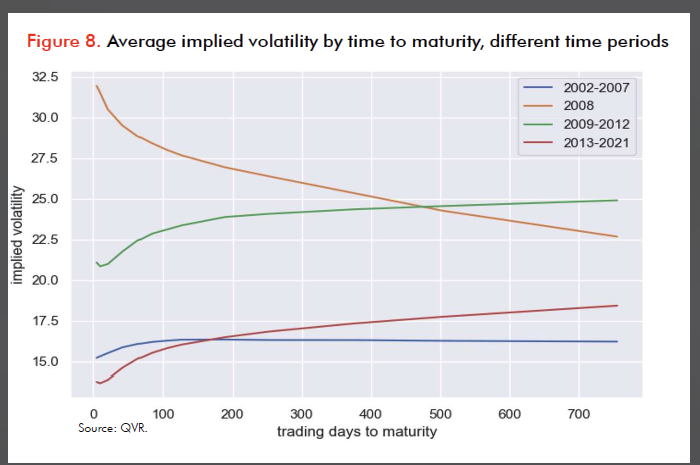
Hedge fund manager (volatility/derivatives), QVR. Personal account. Oathbreaker paladin and Nightreign princess bodyguard. Chief Investment Officer of Antifa.
91 subscribers
How to get URL link on X (Twitter) App

https://twitter.com/bennpeifert/status/2004518534471422095"fair coin" is about right, selling iron condors is a zero expected return trade at mid-market, actually negative expected return if you're crossing bid/ask spread at Captain Condor's size, but let's be generous
https://x.com/bennpeifert/status/2004174863565836485?s=20

https://twitter.com/insideoptions_/status/2004326880460104119making a spreadsheet that says "this thing barely ever happens five times in a row", and using that to justify some insanely massive risky zero-edge trade after it just happened four times in a row, is batshit fucking crazy
https://x.com/ElDawg360/status/1985061130583367783
https://twitter.com/DeItaone/status/1960402442123981224VIX basis to at the money forward S&P volatility is very high, so volatility hedge funds are short VIX futures and long S&P forward volatility and variance against it
https://x.com/bennpeifert/status/1935305657944785320


https://twitter.com/bennpeifert/status/1883579186121781346
 In the pandemic it went as high as 15 but that was because there were insane massive short VIX call positions (Allianz Structured Alpha, etc) that got liquidated in the middle of a massive selloff
In the pandemic it went as high as 15 but that was because there were insane massive short VIX call positions (Allianz Structured Alpha, etc) that got liquidated in the middle of a massive selloff
https://x.com/bennpeifert/status/1881718208828477814Next up we have InfinityQ, an epic fraud in exotic derivatives:
https://x.com/bennpeifert/status/1881102511400161346
https://twitter.com/ThePythonQuant/status/19270790199182954142. August 2011. Had nice EURUSD and USDJPY volatility positions that helped the fund put up a good month. We added to bond basis, converts and levered loans. I sold CDS IG versus buying S&P volatility, that was choppy and the CIO covered it before it converged. But...
https://twitter.com/AnyonCurve/status/1903834805776597441Remember that all volatility selling is not the same. Some kinds of volatility selling are inherently stabilizing to markets. For example, the large institutional flows in call overwriting and cash-secured put selling for equity replacement are very stabilizing...

https://twitter.com/ConvexProblems/status/19013756521770970861) Realized vol dynamics

https://x.com/bennpeifert/status/1894225723373785228

https://twitter.com/prpl8/status/1896676500386238699
 In practice, what the fund was doing was selling upside call ratios on the S&P futures. First of all, if you read my stuff you should know the answer to this: what is the one reason to trade the futures options and not SPX options? Yes: less margin required!
In practice, what the fund was doing was selling upside call ratios on the S&P futures. First of all, if you read my stuff you should know the answer to this: what is the one reason to trade the futures options and not SPX options? Yes: less margin required!
https://twitter.com/alexpotato/status/1215876962809339904... I was loving it, figured we'd found a big seller and was waving them in. My battle-hardened trader Chris Hauck stopped buying and said Benn something feels off to me. He called MS to check everything.
https://twitter.com/bennpeifert/status/1256629844634296320Second, a bit more detail
https://x.com/bennpeifert/status/1362908508237090816

https://twitter.com/stoked_on_waves/status/1894436766117187963On the first point, this is just a simple math thing. If this is the stock prices process (average rate of return mu, volatility sigma):


https://twitter.com/KevinLMak/status/1894200180502630583When you buy a put or sell a call on a stock, you're getting short exposure to the stock. Did you just find a cheat code to get around the borrow cost? No, obviously not, there are no cheat codes for anything in finance, sorry.
https://twitter.com/bennpeifert/status/1893506980783767656For example, if I buy the SPX Mar25-Jun25 atm straddle FVA, on March expiration we'll take the settle price of the S&P 500 and that will be the strike price of my Jun25 straddle. Before March expiration, I don't have a strike, so the straddle "floats" with spot
https://twitter.com/bennpeifert/status/1893506980783767656So for example, the down-var might have a threshold at 90% of current spot and the up-var at 110% of spot. Below 90% of current spot, the client is short variance; above 110% of current spot; the client is long variance.